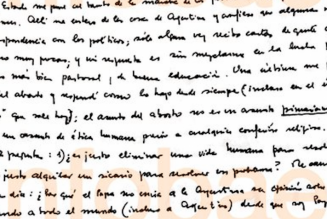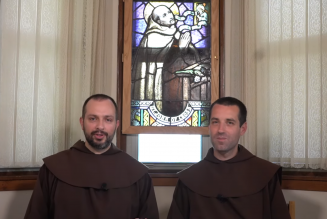
On Sunday, the Fifth Week of Lent Year A, we get a beautiful glimpse of what it is like for Jesus when one of his close friends dies. That means it is a glimpse of what it will be like when you and I die — if we allow him to be our close friend.
It is not only possible for us to be friends with Jesus, it is the whole point of our life.
Friendship with Jesus was a favorite theme of Pope Benedict XVI, one he returned to many times. “Friendship means sharing in thought and will,” he said. It is never “a purely intellectual thing, but a sharing of sentiments and will, hence, also of actions … in an increasingly personal way, listening to him, living together with him, staying with him.”
This is exactly what Lazarus and his sisters did. They invited Jesus into their home for an honest and intimate relationship. They didn’t show him a carefully stage-managed version of themselves using deferential and honorific words; they were completely themselves around Jesus — sitting close to chat with him, and not hiding their disagreements with each other.
We see the same honesty and vulnerability in Sunday’s Gospel. First, Martha, shows that she learned her lesson, and chooses “the better part” by running out to meet Jesus even before he gets to town.
But she is still just as combative and willing to speak her mind as always. “Lord, if you had been here, my brother would not have died,” she says.
“Your brother will rise,” Jesus answers.
“I know he will rise, in the resurrection on the last day,” she retorts.
Then John reports an odd detail: Martha “went and called her sister Mary secretly.” It almost seems as if she had run out to see Jesus without telling her sister at first, maybe showing a little of their sibling rivalry again.
That is the kind of friendship Jesus wants with us.
It is clear from the story of Lazarus and his sisters that Jesus doesn’t just love us. He likes us as well. We should like him as well as love him back.
Don’t put on a show for him. Tell him honestly what’s on your mind. If you think your sister is being a brat, tell him. If you think he’s letting bad things happen for no good reason, complain. “Never doubt his presence!” Pope Benedict said. “Live your lives with joy and enthusiasm, sure of his presence and of his unconditional, generous friendship.”
Compare the friendships in your life where you put on a façade with the ones where you let your guard down: With one, you are always at arm’s length and unsure; with the other, you can be yourself without fearing you will be rejected. You can be yourself with Jesus.
If you think it is harder to have a friendship with Jesus now than it was for Martha and Mary, who saw him standing right in front of them, ask him to show you whether or not it is possible. I have found that I am distracted with all of my friends and they are distracted with me, too — but Jesus is the one friend who is not distracted. He speaks calmly and clearly from the tabernacle if you allow him to, or from the quiet of your room.
What happens when you have this kind of friendship?
As Lent winds down, the Gospel this Sunday paints a beautiful picture of what will happen if you put time and effort into being Jesus’s friend. He will identify himself with you and care for you and look out for you.
The word the sisters sent to Jesus was, “Master, the one you love is ill.” That’s what people will pray when they hear you are in trouble. “Jesus, your good friend is suffering.”
John tells us, “Now Jesus loved Martha and her sister and Lazarus.” And that’s what they will say about you at your funeral. “Jesus loved this one. It was obvious.”
When Mary does come out to where he is, Jesus sees her weeping and that pushes him over the edge. “He became perturbed and deeply troubled, and said, ‘Where have you laid him?’” That’s the kind of relationship you will have with Jesus as a friend: He will see your worry for your daughter, or your spouse, or your sister, or your friend and it will touch him, too.
Then come the famous words: “And Jesus wept. So the Jews said, ‘See how he loved him.’”
Don’t make the mistake of putting Lazarus into a theological category only. He was more than that.
Of course the theological ramifications here are true: This the sixth of seven signs and it leads to Christ’s death because he does it in a public way near Jerusalem. He planned it that way. But it’s also true that the death of his friend broke his Sacred Heart, and he wept for sorrow at the pain of the sisters Lazarus left behind.
This is not a static picture of a milestone the Son of God reaches on the road to the Paschal sacrifice; this is the picture of a fully human Jesus showing us how he loves. As St. John Paul II put it, “In Jesus, God loves humanly, suffers humanly, rejoices humanly. And vice versa: in Jesus, human love, human suffering, human glory acquire divine intensity and power.”
Jesus gave his greatest word of hope for all of us not when he was instructing the Apostles or correcting the Pharisees, but in his words consoling his friend Martha: “I am the resurrection and the life; whoever believes in me, even if he die, shall live.”
The Lord is not despairing or weak or hopeless. He is not defeated by death. He is a warrior going toe to toe with death, and he knows who will win. He says Lazarus is “only sleeping” because there is no death after Jesus; only sleep. Before the Almighty power of Jesus Christ, the paltry power of Satan is like a bat darting away from the blaze of the sun.
But it still crushes Jesus that any of us have to suffer it. It makes him so sad that he was willing to die on the cross to stop it. And when it happens to each of us it will break his heart again and he will long to intervene.
You can see God’s disgust with death and care for its victims throughout time.
You hear it in the Book of Genesis when Almighty God walks in the Garden of Eden where his guilty friends are hiding and calls out, “Where are you?” — and you hear it in the Gospel of Luke when he weeps over Jerusalem.
Again and again, instead of anger, he brings mercy. “If you, O LORD, mark iniquities, LORD, who can stand?” says Sunday’s Psalm. But “With the Lord there is mercy and fullness of redemption.” And, in the reading from Ezekiel he says “O my people, I will open your graves and have you rise from them. …Then you shall know that I am the LORD!”
Those are the words of a heartsick friend, not a harsh judge, and he longs to be that for each of us. He will be, if we let him — a friend who is faithful, even to death on the cross.








